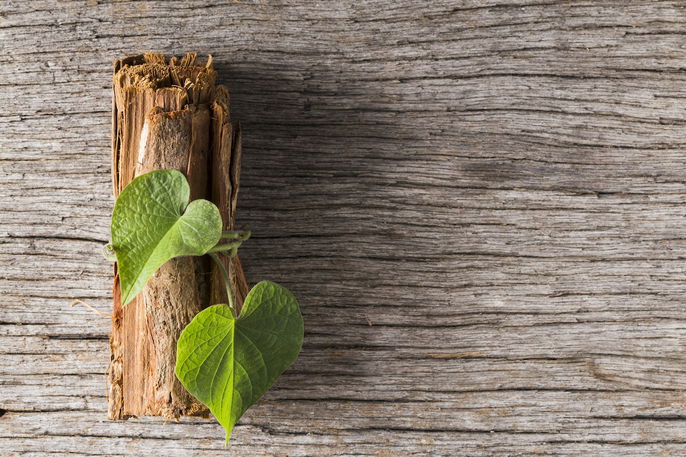Cat’s claw encompasses 2 species of medicinal plants, Uncaria tomentosa and Uncaria guianensis. These possess diuretic, antioxidant, anti-inflammatories, immuno-stimulating and detoxing properties, and can be used to help treat infections and inflammation. They can also strengthen the immune system.
This plant grows in twists and forms branches that climb upward. It has light green leaves with thorns that are slightly curbed, and has a brownish-red and cream stem. Cat’s claw stems store plenty of water to support its own necessities.
Cat‘s claw can be consumed as a tea made from its bark, or in pill form, which can be purchased in natural health product stores.

Health benefits
Cat’s claw contains analgesic, antioxidant, detoxing, diuretic, immuno-stimulating, antimicrobial and anti-inflammatory properties that can provide many health benefits like:
1. Boosting defense mechanisms
Cat’s claw can help to increase the body’s natural defense mechanisms, as it stimulates white blood cell production and activates the immune system to fight off microorganisms.
This benefit may be related to the presence of proanthocyanidins and other substances found in the plant that help to fight of viruses, fungi, protozoans and bacteria like Staphylococcus aureus, Enterococcus faecalis and Pseudomonas aeruginosa.
2. Relieving osteoarthritis symptoms
Some studies show that cat‘s claw contains many alkaloid components that help to inhibit pro-inflammatory substances in the body. It also contains analgesic properties, which can make it a great option for patients with bursitis or joint issues, like arthritis, osteoarthritis and rheumatoid arthritis.
3. Antioxidant action
Cat’s claw contains antioxidant substances, like flavonoids and polyphenols, that prevent damage at a cellular level caused by free radicals. These substances protect the body from oxidative stress to delay early aging and prevent the development of chronic diseases.
4. Anticancerous action
Some studies show that cat’s claw extract can decrease the growth or cause cell death in cancer cells in the colon, gallbladder, thyroid and breast. The exact mechanism behind this action is not fully known, and more scientific studies are needed to support this benefit.
5. Complimenting breast cancer treatment
Chemotherapy produces side effects like leukopenia and neutropenia, which are associated with decreased white blood cell levels in the blood.
Some scientific studies show that using cat‘s claw can reduce these side effects and restore cellular damage caused by chemotherapy in patients with breast cancer. In these cases, it is important to use cat’s claw as guided by your doctor.
6. Improving gastritis
Cat’s claw contains anti-inflammatory properties and antioxidants that can help treat acute or chronic gastritis. It is particularly effective against gastritis caused by high NSAID doses.
It is also thought that cat’s claw can improve conditions like irritable bowel syndrome, Crohn’s disease and stomach ulcers, however more scientific studies are needed to support these benefits.
Learn more about home remedies for gastritis that you can use to compliment your medical treatment.
7. Complimenting Alzheimer’s treatment
Cat’s claw is considered potentially treat Alzheimer’s disease, as a study in rats identified many components (like proanthocyanidin B2, a polyphenol) in this plant. This component is associated with improved short-term memory, reduced brain swelling and decreased plaques in the brain.
8. Reducing blood pressure
Rhynchophylline, which is an alkaloid present in cat’s claw, demonstrates the ability to inhibit platelet aggregation and thrombosis. This can be useful for the prevention of strokes and heart attacks. It can decrease blood pressure, improve circulation and prevent the formation of fatty plaques along the arterial walls. This alkaloid can also prevent blood clot formation in the brain, heart and blood vessels.
Check out other natural ways to lower blood pressure.
Popular uses
Cat’s claw is also commonly used to treat other health conditions, although there are no scientific studies available to prove this plant’s therapeutic affects.
Cat’s claw is popularly used to treat conditions like:
- Rhinitis
- Asthma
- Tonsillitis
- Skin conditions
- Gonorrhea
It is important the cat’s claw is used as directed by a doctor or medicinal plant specialist.
How to take
The bark, roots and leaves of cat’s claw can be used to make tea, tinctures or capsules, which can be obtained at compound pharmacies.
1. Cat’s claw te
To make cat’s claw tea, you will need 20 g of cat’s claw roots and bark and 1 L of water. Boil these ingredients for 15 minutes, then remove from heat and allow to soak, covered for another 10 minutes. Then strain and drink. You should take cat’s claw every 8 hours, between meals.
2. Cat’s claw capsules
The recommended dose of cat’s claw capsules can vary from 250 mg to 100 mg, 2 to 3 times per day, as prescribed. It is best to consult a doctor or medicinal plant specialist when using cat’s claw for a predetermined duration at the correct dose to address specific health conditions.
Possible side effects
Cat’s claw is considered to be safe when used within the recommended doses. Excess consumption can cause side effects like diarrhea, nausea ,stomach ache, decreased progesterone or estrogen levels, decreased heart rate, neuropathy, and in rare cases, acute kidney injury.
In addition, it can increase your risk for bleeding if taken with medications like warfarin, acetylsalicylic acid or heparin.
Contraindications for use
Cat’s claw should not be used by children, pregnant woman or breastfeeding women. It should be avoided by anyone allergic to this plant.
Cat’s claw should not be used by patients with a history of lupus, multiple sclerosis, kidney disease or leukemia.
This medicinal plant should not be used by people with clotting conditions or by anyone who takes anticoagulants. It should not be taken before any surgeries.






























